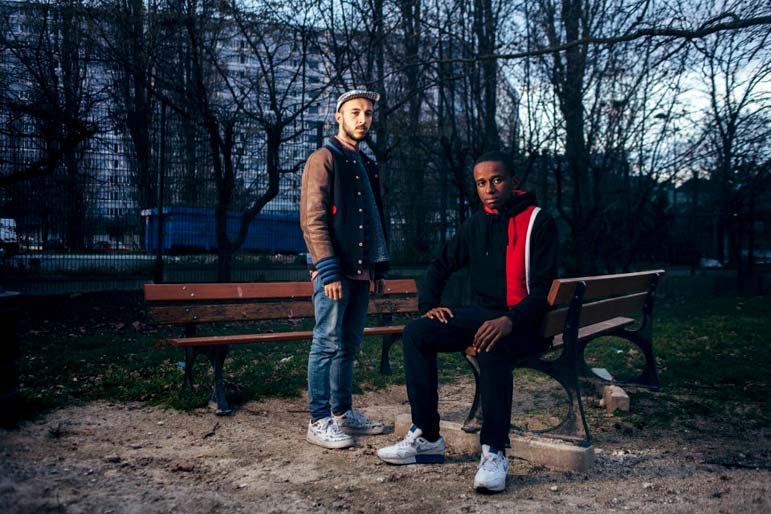 Young French authors Mehdi Meklat (left) and Badroudine Said Abdallah, in Saint-Denis, in 2016, before a scandal over tweets erupted. Washington Post photo by Lucien Lung
Young French authors Mehdi Meklat (left) and Badroudine Said Abdallah, in Saint-Denis, in 2016, before a scandal over tweets erupted. Washington Post photo by Lucien Lung
By the age of 23, the two of them - Mehdi of Algerian origins, Badrou the son of an imam from the Comoros - had already defied all odds and had co-written a novel, produced critically acclaimed documentaries for public television, and had become the darlings of France's chattering classes.
The reason they mattered so much to so many was that Mehdi and Badrou, as they are known here, represented a more hopeful future in a supposedly "colorblind" society that still struggles with racial integration to a staggering degree. Their project, as I wrote in a profile of these two young writers, was to show that the oft-forgotten and marginalized minority communities on the peripheries of French cities are places where real people live their lives - not just the crime-ridden nightmares of the public imagination.
But then came the tweets - anti-Semitic and often in favor of terrorist violence - exposed last month after Medhi and Badrou appeared on yet another magazine cover.
"Bring Hitler to kill the Jews," Meklat had posted - under a pseudonym - back on Feb. 24, 2012.
"Should break the legs of this son of a whore," he posted in 2016, also under a pseudonym, referring to Alain Finkielkraut, the prominent French-Jewish intellectual and son of Holocaust survivors.
"I spit muzzles on the dirty mouth of Charb and all those at Charlie Hebdo," he posted on Dec. 30, 2012, two years before Islamist terrorists would storm into the offices of the satiric newspaper, murdering 12 journalists, including the editor, Stéphane Charbonnier, known as "Charb."
Following the revelation, a considerable public outcry has erupted, rehashing for many the belief that the Paris suburbs and their inhabitants often fight against marginalization in the language of a deep and unshakable anti-Semitism. In a similar instance, the notorious Cameroonian comedian Dieudonne M'bala M'bala relied on routines that railed against what he called "Jewish slave drivers" and played with Holocaust denial.
Meklat - who could not be reached for comment when I called - has insisted on Twitter and in a lengthy Facebook post that the tweets in question were written in the voice of a character he created, Marcelin Duchamps, to mock the soul of old, conservative France, at least as he imagines it. Most of the tweets have since been deleted.
"He allowed himself all the excesses," Meklat wrote of his character, inspired, he said, by the famous French Dada artist Marcel Duchamp. "He was testing the notion of provocation. How far could he go? What would be his limits?"
But critics insist that there is no separating Mehdi Meklat from Marcelin Duchamps - as, eventually, there wasn't, after Meklat merged the Duchamps Twitter account with his own earlier this year.
For France's Jewish community - forced to weather a constant stream of anti-Semitic attacks, large and small - the scandal represents a particularly dangerous kind of "casual," online anti-Semitism.
"What the Meklat Affair shows is that for the generation of Mehdi Melkat - the young - anti-Semitism is almost natural," said Yonatan Arfi, a spokesman for the Representative Council of French Jewish Organizations (CRIF), the largest Jewish advocacy group in France, in an interview. "It's part of their culture, and it's not even considered shocking."
The scandal also become a significant talking point for a populist right to attack the left for its tolerant embrace of multiculturalism.
"Praise of Merah, threats, homophobia, hatred of France and anti-Semitism: why do the media protect Mehdi Meklat?" tweeted Marion Marechal-Le Pen, a National Front parliamentary deputy and the niece of Marine Le Pen, the party's president recently defeated candidate for the French presidency. Mohammed Merah was a French criminal of Algerian descent who was identified by the police as the gunman in attacks in 2012 that left seven dead, including four at a Jewish day school in Toulouse. He was killed by police.
The Le Pens are keen to blame others, especially Arabs and Muslims, for anti-Semitism, as they themselves try to downplay the legacy of Jean-Marie Le Pen, the founder of the National Front and Marine Le Pen's father, who once referred to the Nazi concentration camps as a "detail of history." He was subsequently convicted in a French court for Holocaust denial.
After days of insisting on his artistic license, Mehdi finally apologized for his tweets, invoking his youth and immaturity at the time he posted them.
"I wish to extend my most sincere apologies in the wake of the tweets that I've been posting on under the shadow name of Marcelin Deschamps. I know many of you have been legitimately injured and outraged by these insults," he wrote on Facebook.
The future of this particular youngster in public life is likely to end, but the French left has not disavowed the project that Mehdi and Badrou began, and which I profiled last year, about embracing the complexity and diversity of the France's marginalized communities.
As Christiane Taubira, a former minister of justice, told Le Monde after she had appeared with the two writers on the cover of Les Inrocks, a French magazine: "I refuse to reduce all youth to the fact that one young person has surrendered to what is absolutely incomprehensible and inexcusable."


 Contact The Editor
Contact The Editor
 Articles By This Author
Articles By This Author